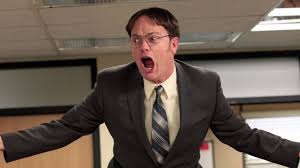
The fluorescent lights hum, the photocopier whirs, and the low murmur of mundane office chatter fills the air. This is the stage for "The Office," a show beloved for its relatable, awkward, and often surprisingly poignant portrayal of cubicle life. Yet, strip away one specific, beet-farming, Assistant (to the) Regional Manager, and what remains isn't a beloved comedy, but precisely what the prompt suggests: a filing cabinet. Without Dwight Schrute, Dunder Mifflin would devolve into a sterile, predictable, and utterly unmemorable collection of neatly organized, but ultimately lifeless, documents.
A filing cabinet is efficient, systematic, and utterly devoid of surprise. It represents order, the antithesis of the beautiful chaos that Dwight Schrute injects into every frame. He is not merely a character; he is the human tornado that rips through the placid waters of Dunder Mifflin, churning up conflict, absurdity, and genuine hilarity. Imagine the office without Jim's ceaseless, elaborate pranks. What makes these pranks so enduringly funny isn't just Jim's creativity, but Dwight's unflappable, often literal-minded, and always indignant reactions. The stapler in Jell-O, the Pavlovian mints, the "Future Dwight" faxes – these are not just gags; they are the narrative bedrock of Jim and Dwight's dynamic, a relationship that provided countless laugh-out-loud moments and showcased the bizarre, yet undeniable, affection that grew between them. Without Dwight's peculiar vulnerability to these antics, Jim's playful antagonism would fall flat, leaving a void where true comedic genius once resided.
Beyond merely providing a target, Dwight is an unhinged anchor, constantly pulling the show into unexpected, idiosyncratic directions. His life outside the office—the Schrute Farms beet farm, the bed-and-breakfast, the volunteer sheriff's deputy duties, his love of Battlestar Galactica, and his bizarre survivalist philosophies—is a bottomless wellspring of comedic material. He brings the utterly absurd into the painfully mundane. His strict adherence to rules, his unwavering loyalty (often misguided) to Michael, his social ineptitude, and his genuine belief in his own superiority create situations that no other character could. Who else would attempt parkour in the office, bring a goose to work, or try to "bear-mace" his colleagues? These moments of pure, unfiltered Dwight-ness are the sparks that ignite the show's most iconic scenes, preventing it from ever settling into a boring, predictable rhythm.
Furthermore, Dwight serves as a crucial catalyst for the reactions and development of every other character. He is Michael Scott's most fervent admirer and most frustrating challenge, providing the perfect foil for Michael's inept leadership and desperate need for approval. Their co-dependent, often volatile, yet undeniably affectionate relationship is a cornerstone of the show's heart. For Pam, Dwight is initially an annoyance, but over time, he becomes a surprising source of support and genuine, if awkward, friendship, revealing his hidden depth. For Angela, he is the secret lover, the rigid counterpart to her own sternness, and their bizarre, passionate affair provides one of the show's most enduring and often hilarious subplots. Dwight is the human litmus test, the character whose presence forces everyone else to react, to adapt, to reveal their true colors. Without him, these relationships would lack their essential friction, their unexpected twists, and their underlying emotional resonance.
In essence, "The Office" is more than just a collection of funny moments; it's a character study of quirky individuals navigating the banality of corporate life. Dwight Schrute, with his boundless energy, his unwavering weirdness, and his unexpected moments of humanity, ensures that this study is never boring. He is the unpredictable element, the wild card that shatters the monotony. Take him away, and you're left with organized rows of papers, neat folders, and functional labels – a filing cabinet, perfectly in order, but utterly devoid of the life, the laughter, and the chaotic charm that made "The Office" truly legendary. He isn't just a part of the show; he is, arguably, its very soul.
@